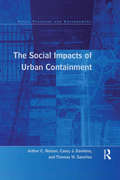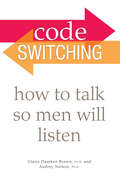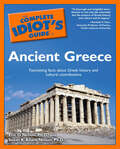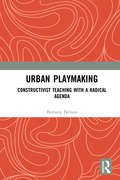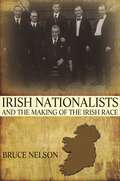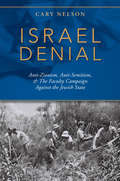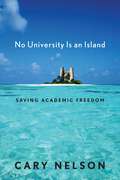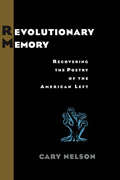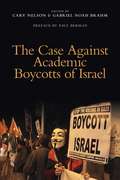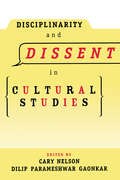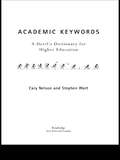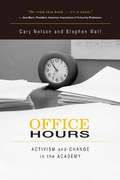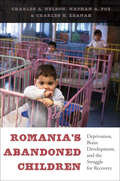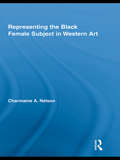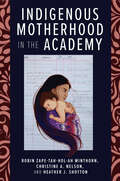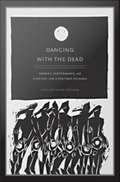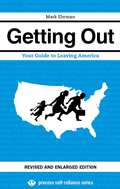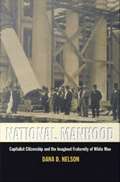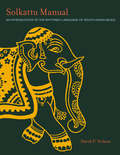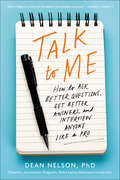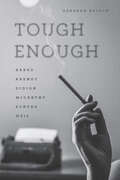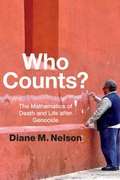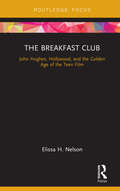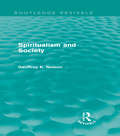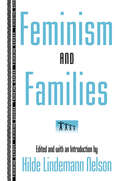- Table View
- List View
The Social Impacts of Urban Containment (Urban Planning And Environment Ser.)
by Arthur C. Nelson Casey J. DawkinsOne of the policies that has been most widely used to try to limit urban sprawl has been that of urban containment. These policies are planning controls limiting the growth of cities in an attempt to preserve open rural uses, such as habitat, agriculture and forestry, in urban regions. While there has been a substantial amount of research into these urban containment policies, most have focused on issues of land use, consumption, transportation impacts or economic development issues. This book examines the effects of urban containment policies on key social issues, such as housing, wealth building and creation, racial segregation and gentrification. It argues that, while the policies make important contributions to environmental sustainability, they also affect affordability for all the economic groups of citizens aside from the most wealthy. However, it also puts forward suggestions for revising such policies to counter these possible negative social impacts. As such, it will be valuable reading for scholars of environmental planning, social policy and regional development, as well as for policy makers.
Code Switching: How to Talk So Men Will Listen
by Audrey Nelson Claire Damken BrownMars and Venus head to work... Day-to-day, face-to-face workplace communication between men and women is often dysfunctional because each gender employs different speech patterns. When careers and paychecks are on the line, clear communication is crucial-from the mailroom to the boardroom. Code Switching explains what to say, how to say it, how to be taken seriously, and how to act while speaking with the opposite sex for maximum effectiveness in the workplace. Included are: How men and women manage conversation, and the value of "chitchat" prior to a meeting. How men use language to impart information and women use language to build or indicate relationship. How men use e-mail to emphasize control while women use it to share and build rapport. How women can use language to build their credibility. How humor is used as a power play, to build territory, or to exclude others. How gender talk creates and shapes work relationships.
The Complete Idiot's Guide to Ancient Greece: Fascinating Facts About Greek History and Cultural Contributions
by Audrey Nelson Eric NelsonThe overwhelming influence of Ancient Greek culture on everything from science and literature to politics continues to be both relevant and hotly debated. In The Complete Idiot's Guide® to Ancient Greece, you are invited to meet the Ancient Greeks and to understand their legacy by entering their world. Profiles the most important contributions of Greek culture, including mythology, philosophy, medicine and the Olympic Games. Includes further reading and travel information to help in planning a personal odyssey.
Urban Playmaking: Constructivist Teaching with a Radical Agenda
by Bethany NelsonThis book explores the concept of playmaking and activism through three research projects in which culturally and linguistically diverse high school students and young adults created original theatre around the issues that inform their lives and constrain their futures. Each study discussed by the author is considered through the lens of one or more best practices. The outcomes of the playmaking experiences, communicated through detailed ethnographic data and the voices of student participants, make a strong case for using what we already know about teaching to positively impact gross inequities of outcome for culturally and linguistically diverse students. This study will be of great interest to students, scholars, and practitioners in Applied Theatre, Theatre Education, and Art Therapy.
Irish Nationalists and the Making of the Irish Race
by Bruce NelsonThis is a book about Irish nationalism and how Irish nationalists developed their own conception of the Irish race. Bruce Nelson begins with an exploration of the discourse of race--from the nineteenth--century belief that "race is everything" to the more recent argument that there are no races. He focuses on how English observers constructed the "native" and Catholic Irish as uncivilized and savage, and on the racialization of the Irish in the nineteenth century, especially in Britain and the United States, where Irish immigrants were often portrayed in terms that had been applied mainly to enslaved Africans and their descendants. Most of the book focuses on how the Irish created their own identity--in the context of slavery and abolition, empire, and revolution. Since the Irish were a dispersed people, this process unfolded not only in Ireland, but in the United States, Britain, Australia, South Africa, and other countries. Many nationalists were determined to repudiate anything that could interfere with the goal of building a united movement aimed at achieving full independence for Ireland. But others, including men and women who are at the heart of this study, believed that the Irish struggle must create a more inclusive sense of Irish nationhood and stand for freedom everywhere. Nelson pays close attention to this argument within Irish nationalism, and to the ways it resonated with nationalists worldwide, from India to the Caribbean.
Israel Denial: Anti-Zionism, Anti-Semitism, & The Faculty Campaign Against the Jewish State
by Cary NelsonA work of “rigorous intellectual inquiry” critiquing the BDS movement in academia (Jewish Journal). Israel Denial is the first book to offer detailed analyses of the work faculty members have published—individually and collectively—in support of the Boycott, Divestment, and Sanctions (BDS) movement; it contrasts their claims with options for promoting peace. The faculty discussed here have devoted a significant part of their professional lives to delegitimizing the Jewish state. While there are beliefs they hold in common—including the conviction that there is nothing good to say about Israel—they also develop distinctive arguments designed to recruit converts to their cause in novel ways. They do so both as writers and as teachers; Israel Denial is the first to give substantial attention to anti-Zionist pedagogy. No effort to understand the BDS movement’s impact on the academy and public policy can be complete without the kind of understanding this book offers.A co-publication of the Academic Engagement Network
No University Is an Island: Saving Academic Freedom (Cultural Front #4)
by Cary NelsonThe modern university is sustained by academic freedom; it guarantees higher education's independence, its quality, and its success in educating students. The need to uphold those values would seem obvious. Yet the university is presently under siege from all corners; workers are being exploited with paltry salaries for full-time work, politics and profit rather than intellectual freedom govern decision-making, and professors are being monitored for the topics they teach.No University Is an Island offers a comprehensive account of the social, political, and cultural forces undermining academic freedom. At once witty and devastating, it confronts these threats with exceptional frankness, then offers a prescription for higher education's renewal. In an insider's account of how the primary organization for faculty members nationwide has fought the culture wars, Cary Nelson, the current President of the American Association of University Professors, unveils struggles over governance and unionization and the increasing corporatization of higher education. Peppered throughout with previously unreported, and sometimes incendiary, higher education anecdotes, Nelson is at his flame-throwing best.The book calls on higher education's advocates of both the Left and the Right to temper conviction with tolerance and focus on higher education's real injustices. Nelson demands we stop denying teachers, student workers, and other employees a living wage and basic rights. He urges unions to take up the larger cause of justice. And he challenges his own and other academic organizations to embrace greater democracy.With broad and crucial implications for the future, No University Is an Island will be the benchmark against which we measure the current definitive struggle for academic freedom.
Revolutionary Memory: Recovering the Poetry of the American Left
by Cary NelsonRevolutionary Memory is the most important book yet to be published about the vital tradition of leftwing American Poetry. As Cary Nelson shows, it is not only our image of the past but also our sense of the present and future that changes when we recover these revolutionary memories. Making a forceful case for political poetry as poetry, Nelson brings to bear his extraordinary knowledge of American poets, radical movements, and social struggles in order to bring out an undervalued strength in a literature often left at the canon's edge. Focused in part of the red decade of the 1930s, Revolutionary Memory revitalizes biographical criticism for writers on the margin and shows us for the first time how progressive poets fused their work into a powerful chorus of political voices. Richly detailed and beautifully illustrated with period engravings and woodcuts, Revolutionary Memory brings that chorus dramatically to life and set a cultural agenda for future work.
The Case Against Academic Boycotts of Israel
by Cary Nelson Gabriel Noah BrahmHow should we understand the international debate about the future of Israel and the Palestinians? Can justice be achieved in the Middle East? Until now, there was no single place for people to go to find detailed scholarly essays analyzing proposals to boycott Israel and the Boycott, Divestment, and Sanctions (BDS) movement of which they are a part. This book for the first time provides the historical background necessary for informed evaluation of one of the most controversial issues of our day-- the struggle between two peoples living side-by-side but with conflicting views of history and conflicting national ambitions. This book encourages empathy for all parties, but it also takes a cold look at what solutions are realistic and possible. In doing so, it tackles issues, like the role of anti-Semitism in calls for the abolition of the Jewish state, that many have found impossible to confront until now. The book gathers essays by an international cohort of scholars from Britain, Israel, and the United States.
Disciplinarity and Dissent in Cultural Studies
by Cary Nelson Dilip Parameshwar GaonkarFirst published in 1996. Routledge is an imprint of Taylor & Francis, an informa company.
Academic Keywords: A Devil's Dictionary for Higher Education
by Cary Nelson Stephen WattKnow what academic freedom is? Or what it's come to mean? What's affirmative about affirmative action these days? Think you're up on the problem of sexual harassment on campus? Or know how much the university depends on part-time faculty? Academic Keywords is a witty, informed, and sometimes merciless assessment of today's campus, an increasingly corporatized institution that may have bitten off more than its administration is ready to chew. Cary Nelson and Steve Watt use the format of a dictionary to present stories and reflections on some of the most pressing issues affecting higher education in America. From the haphazard treatment of graduate students to the use and abuse of faculty (as well as abuses commited by faculty), Nelson and Watt present a compelling and, at times, enraging report on the state of the campus.
Office Hours: Activism and Change in the Academy
by Cary Nelson Stephen WattIn a series of stinging analyses, this book examines the current sorry state of higher education. The second half of the volume offers "alternative futures" for the academy, visions that involve academic organizations, public outreach through the internet, faculty unionization, and campus organizing. Office Hours is a roll-up-your-sleeves look at the avoidable disaster facing the modern university.
Romania's Abandoned Children: Deprivation, Brain Development, and the Struggle for Recovery
by Charles A. Nelson Nathan A. Fox Charles H. ZeanahThe implications of early experience for children's brain development, behavior, and psychological functioning have long absorbed caregivers, researchers, and clinicians. The 1989 fall of Romania's Ceausescu regime left approximately 170,000 children in 700 overcrowded, impoverished institutions across Romania, and prompted the most comprehensive study to date on the effects of institutionalization on children's well-being. "Romania's Abandoned Children," the authoritative account of this landmark study, documents the devastating toll paid by children who are deprived of responsive care, social interaction, stimulation, and psychological comfort. Launched in 2000, the Bucharest Early Intervention Project (BEIP) was a rigorously controlled investigation of foster care as an alternative to institutionalization. Researchers included 136 abandoned infants and toddlers in the study and randomly assigned half of them to foster care created specifically for the project. The other half stayed in Romanian institutions, where conditions remained substandard. Over a twelve-year span, both groups were assessed for physical growth, cognitive functioning, brain development, and social behavior. Data from a third group of children raised by their birth families were collected for comparison. The study found that the institutionalized children were severely impaired in IQ and manifested a variety of social and emotional disorders, as well as changes in brain development. However, the earlier an institutionalized child was placed into foster care, the better the recovery. Combining scientific, historical, and personal narratives in a gripping, often heartbreaking, account, "Romania's Abandoned Children "highlights the urgency of efforts to help the millions of parentless children living in institutions throughout the world.
Representing the Black Female Subject in Western Art (Routledge Studies on African and Black Diaspora)
by Charmaine A. NelsonThis book offers the first concentrated examination of the representation of the black female subject in Western art through the lenses of race/color and sex/gender. Charmaine A. Nelson poses critical questions about the contexts of production, the problems of representation, the pathways of circulation and the consequences of consumption. She analyzes not only how, where, why and by whom black female subjects have been represented, but also what the social and cultural impacts of the colonial legacy of racialized western representation have been. Nelson also explores and problematizes the issue of the historically privileged white artistic access to black female bodies and the limits of representation for these subjects. This book not only reshapes our understanding of the black female representation in Western Art, but also furthers our knowledge about race and how and why it is (re)defined and (re)mobilized at specific times and places throughout history.
Indigenous Motherhood in the Academy
by Christine A. Nelson Tiffany S. Lee Leola Tsinnajinnie-Paquin Susan Faircloth Nicole Reyes Nizhoni Chow-Garcia Michelle Johnson-Jennings Alayah Johnson-Jennings Ahnili Johnson-Jennings Dwanna L. McKay Miranda Belarde-Lewis Shelly Lowe Tria Blu Wakpa Symphony Oxendine Denise Henning Renée Holt Robin Zape-tah-hol-ah Minthorn Otakuye Conroy-Ben Theresa Gregor Sloan Woska-pi-mi Shotton Heather J. Shotton Pearl Brower Erin Kahunawaika?ala Wright Kaiwipuni Lipe Charlotte Davidson Stephanie WatermanIndigenous Motherhood in the Academy highlights the experiences and narratives emerging from Indigenous mothers in the academy who are negotiating their roles in multiple contexts. The essays in this volume contribute to the broader higher education literature and the literature on Indigenous representation in the academy, filling a longtime gap that has excluded Indigenous women scholar voices. This book covers diverse topics such as the journey to motherhood, lessons through motherhood, acknowledging ancestors and grandparents in one’s mothering, how historical trauma and violence plague the past, and balancing mothering through the healing process. More specific to Indigenous motherhood in the academy is how culture and place impacts mothering (specifically, if Indigenous mothers are not in their traditional homelands as they raise their children), how academia impacts mothering, how mothering impacts scholarship, and how to negotiate loss and other complexities between motherhood and one’s role in the academy.
Dancing with the Dead: Memory, Performance, and Everyday Life in Postwar Okinawa
by Christopher NelsonChallenging conventional understandings of time and memory, Christopher T. Nelson examines how contemporary Okinawans have contested, appropriated, and transformed the burdens and possibilities of the past. Nelson explores the work of a circle of Okinawan storytellers, ethnographers, musicians, and dancers deeply engaged with the legacies of a brutal Japanese colonial era, the almost unimaginable devastation of the Pacific War, and a long American military occupation that still casts its shadow over the islands. The ethnographic research that Nelson conducted in Okinawa in the late 1990s--and his broader effort to understand Okinawans' critical and creative struggles--was inspired by his first visit to the islands in 1985 as a lieutenant in the U. S. Marine Corps. Nelson analyzes the practices of specific performers, showing how memories are recalled, bodies remade, and actions rethought as Okinawans work through fragments of the past in order to reconstruct the fabric of everyday life. Artists such as the popular Okinawan actor and storyteller Fujiki Hayato weave together genres including Japanese stand-up comedy, Okinawan celebratory rituals, and ethnographic studies of war memory, encouraging their audiences to imagine other ways to live in the modern world. Nelson looks at the efforts of performers and activists to wrest the Okinawan past from romantic representations of idyllic rural life in the Japanese media and reactionary appropriations of traditional values by conservative politicians. In his consideration of eisā, the traditional dance for the dead, Nelson finds a practice that reaches beyond the expected boundaries of mourning and commemoration, as the living and the dead come together to create a moment in which a new world might be built from the ruins of the old.
Getting Out
by Cletus Nelson Mark EhrmanOne of the most popular titles in Process' Self-Reliance series, Getting Out is a smartly designed and easy-to-navigate compendium about your best options for a new homeland, and how to navigate a myriad of hurdles before and after you get there. Here are the rules, resources, and experiences of dozens of expat Americans on every continent, including author Mark Ehrman, who moved from Los Angeles to Berlin after publishing Getting Out. The updated and expanded edition contains new information on taxes, healthcare, food, drink, drugs, security, and suggestions about how to start a business or make a living in foreign lands.
National Manhood: Capitalist Citizenship and the Imagined Fraternity of White Men
by Dana D. NelsonNational Manhood explores the relationship between gender, race, and nation by tracing developing ideals of citizenship in the United States from the Revolutionary War through the 1850s. Through an extensive reading of literary and historical documents, Dana D. Nelson analyzes the social and political articulation of a civic identity centered around the white male and points to a cultural moment in which the theoretical consolidation of white manhood worked to ground, and perhaps even found, the nation. Using political, scientific, medical, personal, and literary texts ranging from the Federalist papers to the ethnographic work associated with the Lewis and Clark expedition to the medical lectures of early gynecologists, Nelson explores the referential power of white manhood, how and under what conditions it came to stand for the nation, and how it came to be a fraternal articulation of a representative and civic identity in the United States. In examining early exemplary models of national manhood and by tracing its cultural generalization, National Manhood reveals not only how an impossible ideal has helped to form racist and sexist practices, but also how this ideal has simultaneously privileged and oppressed white men, who, in measuring themselves against it, are able to disavow their part in those oppressions. Historically broad and theoretically informed, National Manhood reaches across disciplines to engage those studying early national culture, race and gender issues, and American history, literature, and culture.
Solkattu Manual: An Introduction to the Rhythmic Language of South Indian Music
by David P. NelsonSolkattu, the spoken rhythms and patterns of hand-clapping used by all musicians and dancers in the classical traditions of South India, is a subject of worldwide interest--but until now there has not been a textbook for students new to the practice. Designed especially for classroom use in a Western setting, the manual begins with rudimentary lessons in the simplest South Indian tala, or metric cycle, and proceeds step-by-step into more challenging material. The book then provides lessons in the eight-beat adi tala, arranged so that by the end, students will have learned a full percussion piece they can perform as an ensemble. Solkattu Manual includes web links to video featuring performances of all 150 lessons, and full performances of all three of the outlined small-ensemble pieces. Ideal for courses in world music and general musicianship, as well as independent study. Book lies flat for easy use.
Talk to Me: How to Ask Better Questions, Get Better Answers, and Interview Anyone Like a Pro
by Dean Nelson“Dean Nelson is one of the best interviewers around.” —Anne LamottFrom respected journalist, professor, and founder of the Writer's Symposium by the Sea, an indispensable guide to the subtle art of the interview guaranteed to afford readers with the skills and confidence they need the next time they say, "talk to me."Interviewing is the single most important way journalists (and doctors, lawyers, social workers, teachers, human resources staff, and, really, all of us) get information. Yet to many, the perfect interview feels more like luck than skill—a rare confluence of rapport, topic, and timing. But the thing is, great interviews aren’t the result of serendipity and intuition, but rather the result of careful planning and good journalistic habits. And Dean Nelson is here to show you how to nail the perfect interview every time. Drawing on forty-years of award-winning journalism and his experience as the founder and host of the Writer’s Symposium by the Sea, Nelson walks readers through each step of the journey from deciding whom to interview and structuring questions, to the nitty gritty of how to use a recording device and effective note-taking strategies, to the ethical dilemmas of interviewing people you love (and loathe). He also includes case studies of famous interviews to show readers how these principles play out in real time.Chock full of comprehensive, time-tested, gold-standard advice, Talk to Me is a book that demystifies the art and science of interviewing, in the vein of On Writing Well or How to Read Literature Like a Professor.
Tough Enough: Arbus, Arendt, Didion, McCarthy, Sontag, Weil
by Deborah NelsonThis book focuses on six brilliant women who are often seen as particularly tough-minded: Simone Weil, Hannah Arendt, Mary McCarthy, Susan Sontag, Diane Arbus, and Joan Didion. Aligned with no single tradition, they escape straightforward categories. Yet their work evinces an affinity of style and philosophical viewpoint that derives from a shared attitude toward suffering. What Mary McCarthy called a “cold eye” was not merely a personal aversion to displays of emotion: it was an unsentimental mode of attention that dictated both ethical positions and aesthetic approaches. Tough Enough traces the careers of these women and their challenges to the pre-eminence of empathy as the ethical posture from which to examine pain. Their writing and art reveal an adamant belief that the hurts of the world must be treated concretely, directly, and realistically, without recourse to either melodrama or callousness. As Deborah Nelson shows, this stance offers an important counter-tradition to the familiar postwar poles of emotional expressivity on the one hand and cool irony on the other. Ultimately, in its insistence on facing reality without consolation or compensation, this austere “school of the unsentimental” offers new ways to approach suffering in both its spectacular forms and all of its ordinariness.
Who Counts?: The Mathematics of Death and Life after Genocide
by Diane M. NelsonIn Who Counts? Diane M. Nelson explores the social life of numbers, teasing out the myriad roles math plays in Guatemalan state violence, economic exploitation, and disenfranchisement, as well as in Mayan revitalization and grassroots environmental struggles. In the aftermath of thirty-six years of civil war, to count--both numerically and in the sense of having value--is a contested and qualitative practice of complex calculations encompassing war losses, migration, debt, and competing understandings of progress. Nelson makes broad connections among seemingly divergent phenomena, such as debates over reparations for genocide victims, Ponzi schemes, and antimining movements. Challenging the presumed objectivity of Western mathematics, Nelson shows how it flattens social complexity and becomes a raced, classed, and gendered skill that colonial powers considered beyond the grasp of indigenous peoples. Yet the Classic Maya are famous for the precision of their mathematics, including conceptualizing zero long before Europeans. Nelson shows how Guatemala's indigenous population is increasingly returning to Mayan numeracy to critique systemic inequalities with the goal of being counted--in every sense of the word.
The Breakfast Club: John Hughes, Hollywood, and the Golden Age of the Teen Film (Cinema and Youth Cultures)
by Elissa H. NelsonThe Breakfast Club is a quintessential teen film. This book analyzes how multiple factors coalesced to solidify the status of The Breakfast Club as one of the most emblematic films of the 1980s and one of the most definitive teen films of the genre. The film brings together genre-defining elements – the conflicts between generations and peer pressure, archetypical characters and breaking down stereotypes, the celebration and survival of adolescence, and the importance of this time in life on the coming-of-age process – and became a significant moment for John Hughes as an auteur and for teen films in the 1980s. More than just embodying these elements of the genre, filmmaker Hughes and the Brat Pack stars helped introduce and popularize multiple generic features that would come to be expected with the teen film formula. The content of the film combined with its context of production in the middle of a boom in teen filmmaking in Hollywood. Meanwhile, the marketing that focused on contemporary music, peer group dynamics, and oppositions between Generation X and baby boomers, merged with an enthusiastic reception by youth audiences. Its endurance speaks to the way the film’s level of importance as a critical, commercial, and influential film with tremendous impact has grown since its initial debut.
Spiritualism and Society (Routledge Revivals)
by G. K. NelsonFirst published in 1969, this title explores the origins of Spiritualism as a religious movement. The first part is a history of Spiritualism, with a focus on its origins within America and the development of the organisation within itself. Next, Nelson considers the rise of Spiritualism in Britain, using evidence taken from contemporary journals, other publications and interviews. Finally, the Spiritualist movement is analysed in terms of sociological theory, looking at the Church and the definition of a Cult, as well as concepts of authority and leadership. This is a fascinating work, which will be of great interest to students researching the origins and development of the movement of Spiritualism and its relationship with society.
Feminism and Families (Thinking Gender)
by Hilde Lindemann NelsonA ground-breaking volume of all new essays covering the conjunction of two topics--feminism and families--that, for all their centrality in our culture, have not been adequately examined in light of one another. While the family has suffered feminist neglect, most women are in fact members of families, living their lives within the social context of families, even at a time when the concept of "family" has become bewilderingly unstable. The intersection of families and feminism is thus one in need of philosophical reflection, as a basis both for good public policy and for the ethical relationships of intimate life.
